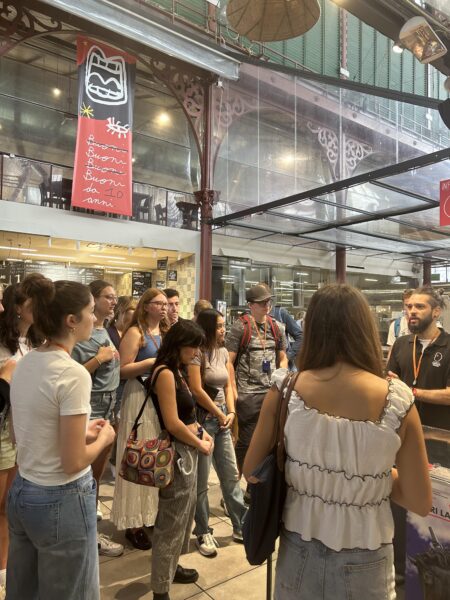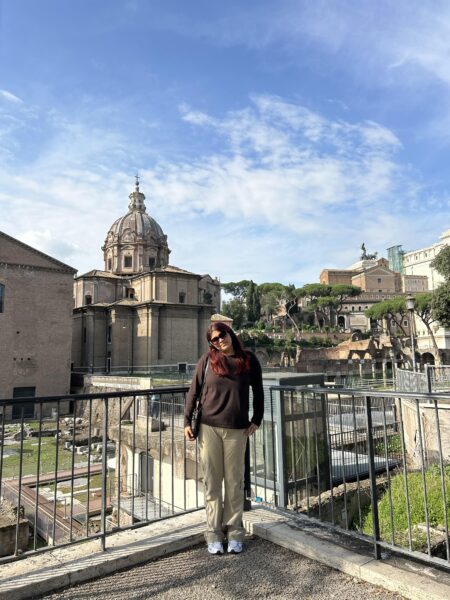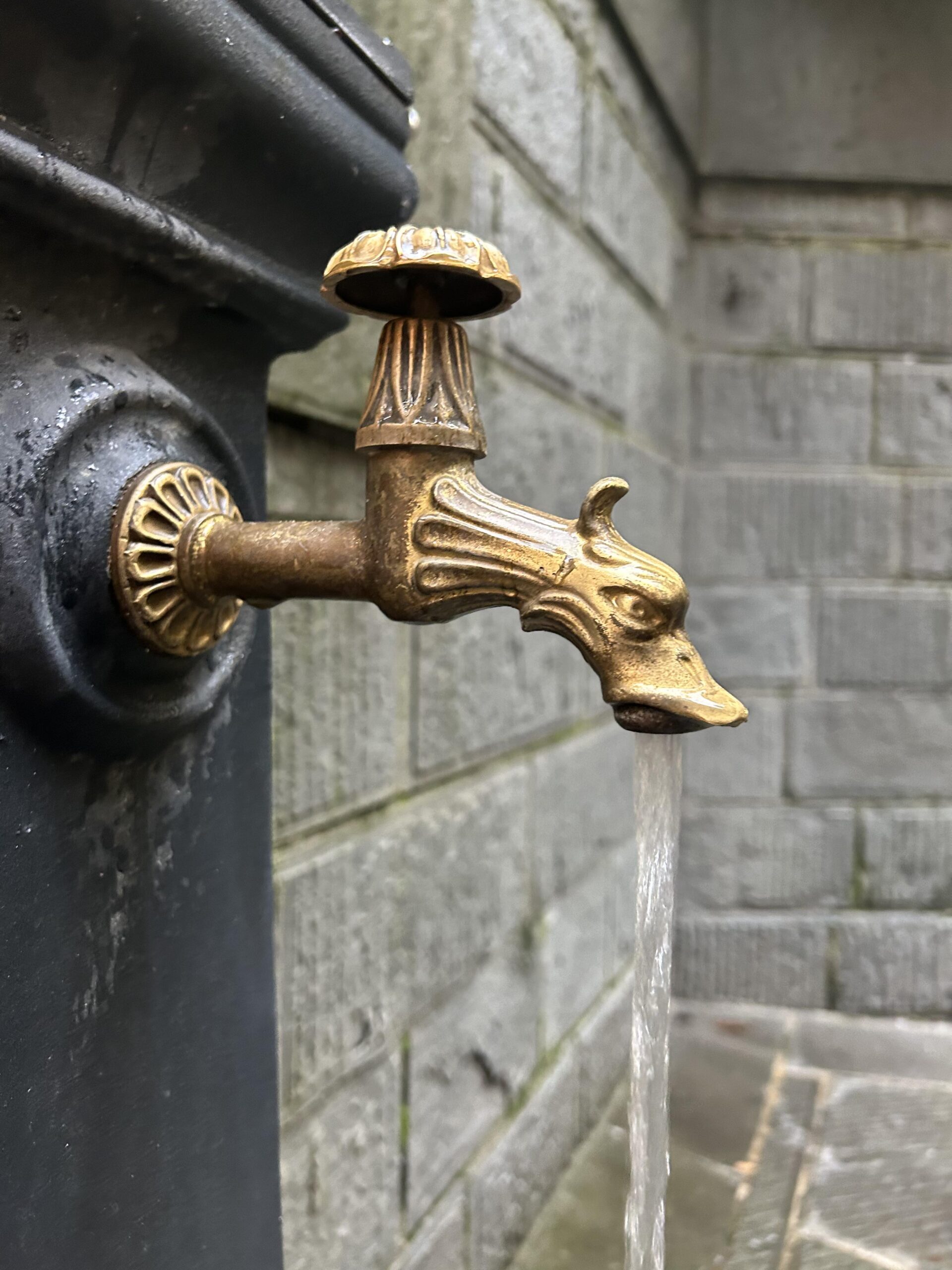34
Eager to follow in the footsteps of a college student who studied abroad in Italy? We recently caught up with AIFS Abroad participant Abby from Chapman University who did a study abroad program in the historic city of Florence during fall semester.
Read on to learn more about how Abby’s experience in Florence with AIFS Abroad helped her expand her global perspective and advance her Environmental Science education.
Choosing a Study Abroad Program Destination & Term
Deciding when and where to study or intern abroad can be a challenge for a lot of students and young professionals (our team can help with that!), but no matter where you go, you’re in for the adventure of a lifetime! Abby chose Florence because it’s a great destination to learn about sustainability practices and Italian culture.
There are many scholarship and grant opportunities available to students who want to study abroad but are in need of financial assistance, like Abby who was awarded the John S. Linakis Scholarship.
Academics Abroad
If you choose to study abroad with AIFS Abroad, there are a number of international destinations you can select as your host city, all of which offer amazing programs and courses that will help you earn credit toward your degree. Also, if you’re like Abby, you may prefer how different the academic experience abroad can be from your experience in the U.S. Abby explains how at her home university, she had to juggle a wide range of classes spread out all across her campus, but her experience studying in Florence was different and more centralized:
“A key difference was the centralized nature of my academic setting. My four classes were all in one building, on one floor, with a library and study space right nearby. It created a distinct divide between being in ‘school’ and in ‘Florence.’ Once I stepped out of the building, I was back in the bustling streets of the city—immersed in the Italian community—while my school remained behind within the walls of the classroom. The centralized space also meant I ran into professors and classmates all the time, which created a strong sense of connection that facilitated casual and consistent interactions during class breaks.”
She goes on to discuss how she adjusted to her hands-on classes in Florence:
“The biggest adjustment was the hands-on nature of two of my classes, Food Culture in Italy and Palaces and Villas. Instead of just sitting in the classroom, our classes often took place in the city, visiting food markets, villas, and other significant landmarks, which also bled into the presentations students had for assignments. These experiences added so much dimension to what we were already learning and made it easier to connect the dots between the content of the class and the places themselves.”
Abby got to enroll in several unique courses that she wouldn’t be able to take at her home university, including Food Culture in Italy; Palaces and Villas; Women in Italy; and Magic, Religion, and Popular Beliefs—all while earning credit towards her Environmental Science degree!

Sustainable Studies
As an Environmental Science major, Abby is interested in learning about sustainable solutions that address some of the major challenges that people are facing across the globe. During her study abroad program in Florence, she took classes that built upon her existing knowledge in the field and allowed her to expand her perspective on the subject. Below, she talks a little bit about how sustainability practices are integrated in Italy:
“In Italy, sustainability seemed deeply embedded in both cultural practices and societal values. One noticeable example was the country’s comprehensive waste management system, where trash is consistently sorted into recyclables, compost, and regular waste, and fines are imposed for non-compliance. This commitment to sustainability is visible in well-maintained public spaces, and people seem genuinely proud of their clean surroundings. In contrast, in the U.S., waste management practices can vary widely depending on the city, and sustainability efforts are often less consistent across regions.”
Furthermore, her classes at the AIFS Global Education Center all touched on sustainability and helped her advance her Environmental Science knowledge, including her Food Culture in Italy class:
“The Food Culture in Italy class helped me move beyond the scientific and policy-driven aspects of sustainability and explore its sociological and ethical sides. I was able to reflect on how food consumers can make better choices and how to build bridges between urban and rural communities since there is often a disconnect between consumers and the environmental impacts of their choices. For instance, Italian brands often emphasize sustainability in their marketing and proudly showcase their production processes and sustainable practices through packaging, social media, and company mission statements. These practices resonate with consumers and reflect a cultural emphasis on transparency and responsible consumption, deepening my understanding of how sustainability can be integrated not only into policy but also into the values and behaviors of individuals and businesses alike.”
Transportation
For American students who rely on cars at home, the prevalence of quality public transportation in a new country often comes as a pleasant surprise. Abby describes her experience getting around Florence, and Italy in general, thanks to easily accessible transportation options:
“Transportation stood out as a significant area where Italy’s reliance on trains, buses, and walkable cities, many of which restrict car usage, offered an alternative to the car-centric lifestyle in the U.S.”
As Abby explains about her experience in Florence, one benefit of great transportation is that it allows you to get out of the city and immerse yourself in local landscapes and nature. It’s important to keep in mind that when you study abroad, you’ll have access to much more than just your study abroad city—the whole region, country, and beyond is waiting for you to get out and explore!
“Something I was really looking forward to during my time abroad was experiencing nature in Italy. Growing up in New York, my exposure to nature was limited, and what I did experience was often curated or confined to city parks. While the U.S. has many wonderful nature spots, it was meaningful for me to explore more natural, untouched environments in Italy. Without the need for a car, I had the opportunity to visit places where nature felt more accessible and meaningful.”


Developing a Diverse Perspective
Another benefit of studying abroad is it helps you cultivate a diverse perspective. You can learn about your destination’s culture from the locals themselves, who can give you a deeper understanding of the community’s culture and history, helping you to broaden your perspective.
“There’s something incredibly unique about being taught by people who have lived the culture they’re teaching… Our Italian professors shared personal stories and insider tips, like where to find the best gelato or how to navigate the food markets, which added a deeper, more personal layer to what we were studying.”
In addition to learning about the local culture, you’ll also develop a greater perspective on the diversity of the U.S. and the world as a whole. With an AIFS Abroad program, you’ll not only meet people from all around the world, but you’ll also meet plenty of other program participants who come from all around the U.S., many of whom may become some of your closest friends:
“Then there were my AIFS peers, who came from all over the U.S., each bringing their own experiences and perspectives into the program. It was exciting to hear how different universities approach similar subjects and how those differences shaped the way we each processed the material, including the subjects we learned in class. For example, in our Women in Italy class, we discussed how education, particularly around reproductive health, varied greatly across Italy, with notable differences between northern and southern regions. Members of our class, coming from the (American) Northeast, South, and West Coast, had vastly different experiences with their health education. The students I interacted with weren’t just diverse in terms of where they came from, but also in their intellectual and personal frameworks. This diversity in backgrounds and experiences really added depth to our class discussions, allowing us to explore different perspectives and realize how access to and the quality of education can vary widely across regions and cultures, even in the same country.”
Two of the most valuable aspects of expanding your perspective are realizing how differently people’s opinions can vary around the same subject and finding parallels even between vastly different cultures:
“As I’ve continued my studies and engaged in conversations across different contexts, including during my time abroad, my perspective has evolved. Conversations surrounding diversity and inclusion with my professors and peers, along with observations I had overall during my time abroad, were refreshing and challenged me to rethink how I understand diversity and inclusion in my own context. For instance, in my Women in Italy class, we discussed contemporary political issues like immigration, a topic that revealed similar parallels between Italy and the U.S. These discussions showed me that diversity, equity, and inclusion are not just domestic challenges, but are topics being heavily debated across multiple areas of the world.”
Professional Growth
Studying abroad is a great way to advance your academic career while helping you discover the various career paths you might like to pursue after you graduate. For those who want to start gaining hands-on experience in their prospective field, there are Full-Time Internship abroad programs available, along with Study + Internship programs that combine a part-time internship with classes. For Abby, an aspiring college professor, studying abroad helped her learn about classroom dynamics and teaching styles she was never exposed to in the U.S.:
“Studying abroad has given me a valuable perspective on different teaching and learning styles across country lines, and it was exciting for me to see how classroom dynamics varied from one classroom to another. This was especially significant for me, as my career goals include being a college professor. Observing how our professors interacted with students—not just in terms of the subject matter but also in engaging with students from different cultural backgrounds—provided me with valuable insight into how to approach teaching. Teachers adapted their methods to fit the environment but also made it clear that students needed to be ready to adapt as well, such as attending class on time consistently and being able to teach themselves and work on material outside the classroom. This balance of being flexible without over-accommodating helped me see how I can create a learning environment that encourages mutual respect and growth, both for the students and for myself as a future professor.”
Abby compared how her professors with AIFS Abroad in Florence were more personable and connected their subject matter to local contexts and their own lives, encouraging each student to share their opinion and openly discuss various topics. Plus, Abby and her classmates even got to share meals with their professors and enjoy their favorite gelato recommendations—talk about building local connections!
“Professors in the U.S. tend to focus on the material without bringing much of their personal experiences into the discussion, but in my AIFS classrooms, the approach felt more personally integrated. Professors often shared stories or examples from their own lives that connected directly to what we were learning, making the material feel more grounded and relevant. We also had multiple opportunities to try new foods and share dinners with our professors, where the atmosphere was relaxed and inclusive—they understood we were not only experiencing a new classroom but also a new country. These moments weren’t just about the meal, they gave us a chance to talk about class-related topics or even unrelated ones, and it felt like we had more of a mentor than an authoritative figure. Our professors always made it clear they were happy to listen and support us with whatever we needed, even if it was to ask about some great gelato recommendations! These experiences made learning feel less formal and more personal, showing me how valuable those connections can be in fostering a supportive educational environment. It’s a perspective I hope to carry into my own teaching someday.”

Final Thoughts
Reflecting on her experiences studying abroad in Florence, and her drive to pursue sustainability and Environmental Science, Abby offers these thoughts about how her perspective has changed:
“I’ve come to see sustainability, diversity, and inclusion as deeply interconnected principles that influence not only our personal choices but also the cultural and societal systems we navigate. Through unique and engaging classes like Magic, Religion, and Popular Beliefs, and Food Culture in Italy, I explored topics that were both fun and thought-provoking while connecting them to my Environmental Science major in meaningful ways. Italy’s thoughtful approach to environmental practices highlighted how sustainability can be a force for both social justice and ecological restoration, offering a window into what a more positive relationship with the Earth could look like… These experiences have strengthened my commitment to fostering positive change in all the social and geographical communities I hope to explore.”
Are you a student who’s ready to take the leap and study abroad like Abby did in Florence with AIFS Abroad? We’d love to help you start your journey!
Here at AIFS Abroad, we know a thing or two about helping college students and pre-professionals study and intern abroad. Our programs are incredibly inclusive, which takes a lot of the stress out of planning. From coordinating your housing to providing things like cultural and social activities, excursions, comprehensive insurance, 24/7 emergency support, on-site staff, and more, you’ll take comfort in knowing you’ll have support throughout your entire experience abroad.
Source link
All Materials on this website/blog are only for Learning & Educational purposes. It is strictly recommended to buy the products from the original owner/publisher of these products. Our intention is not to infringe any copyright policy. If you are the copyright holder of any of the content uploaded on this site and don’t want it to be here. Instead of taking any other action, please contact us. Your complaint would be honored, and the highlighted content will be removed instantly.
